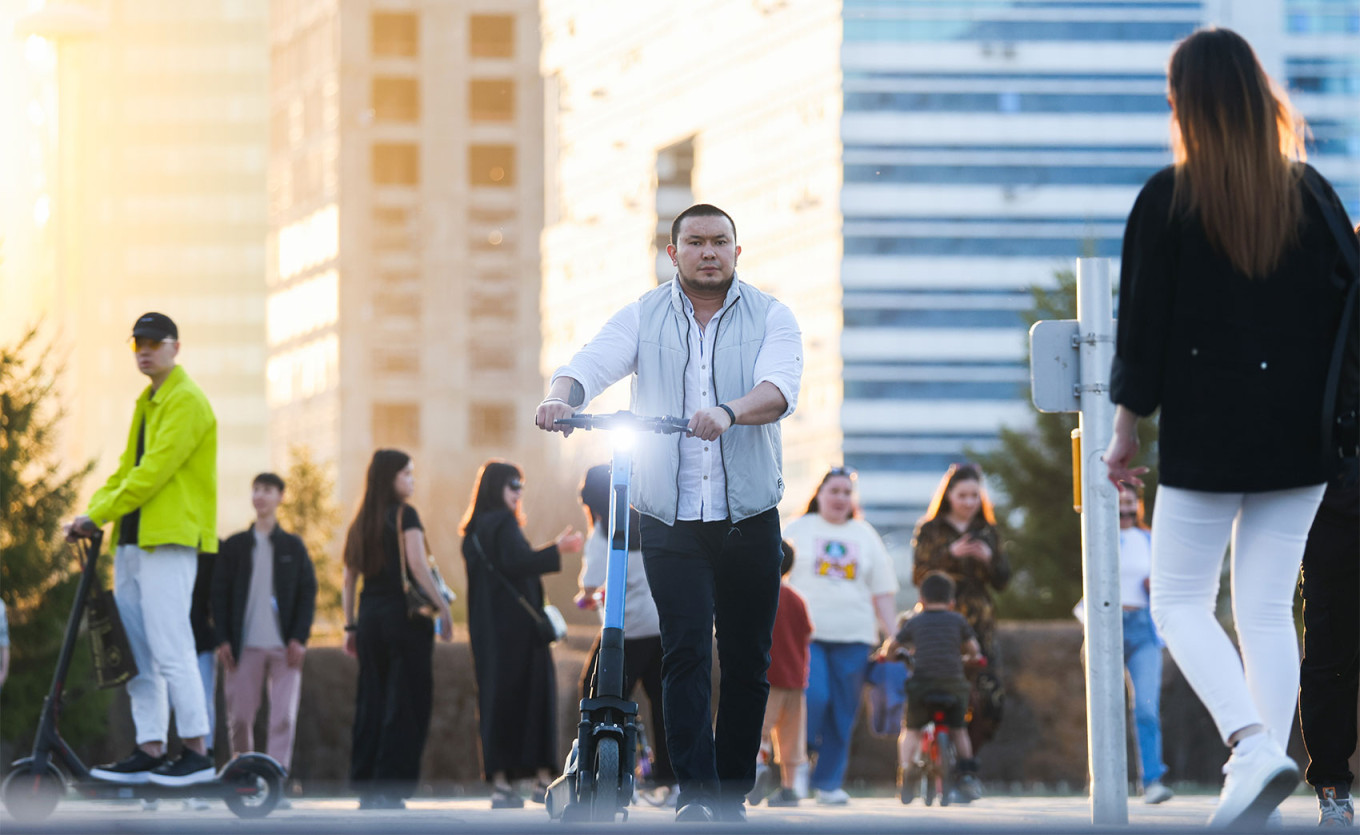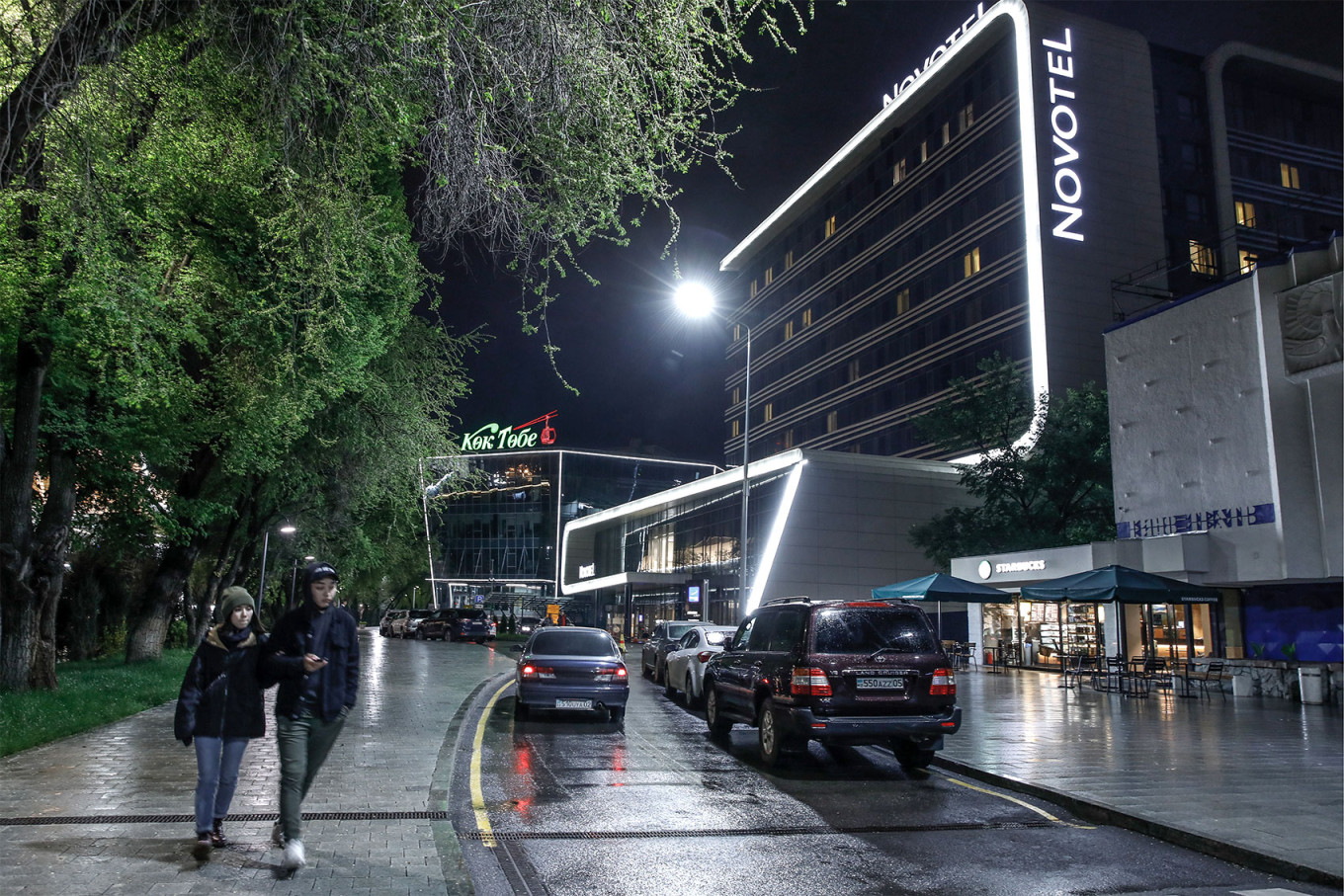When journalist Yevgeniya Baltatarova arrived in Kazakhstan in March 2022, she had no plans to stay in the country long-term.
Just days before, the Federal Security Service (FSB) raided her apartment in Ulan-Ude, the capital of the Siberian republic of Buryatia. According to Baltatarova, the officers were searching for evidence proving that she violated a then-unpassed “army fakes” law when covering Russia’s invasion of Ukraine on her YouTube and Telegram channels.
“I was in a panic and had a desire to just hide somewhere for a while,” Baltatarova told The Moscow Times.
Eighteen months later, Baltatarova — who was later placed on Russia’s wanted list — is still in Kazakhstan, living with the constant fear that she could be deported to Russia and imprisoned, but yet unable to go to a safer location.
Baltatarova is one of at least five political activists and 12 military deserters who fled to Kazakhstan in hopes of escaping criminal prosecution in Russia, but found themselves caught in the web of the country’s complicated geopolitical position.
All of these exiles live in fear that each new day could bring them closer to a Kazakh detention facility — and a Russian prison after that.
Kazakhstan, which shares a 7,644-kilometer border with Russia and allows Russian citizens to enter with just an internal ID, became one of the primary destinations for Russian emigres following the February 2022 invasion of Ukraine.
In December 2022, Kazakhstan’s migration service said that as many as 2.9 million Russian citizens crossed the border with Kazakhstan that year, though both official and independent reports estimate the number of those who remained in the country to be around 100,000.
“Everyone asks: ‘Why did you run to Kazakhstan? It is not safe here!’ Well, most of us just didn’t have passports [for traveling abroad]!” said Baltatarova.

Kazakhstan’s government has not backed Russia’s invasion of Ukraine and refused to recognize occupied Ukrainian territories as a part of Russia.
At the same time, it retains strong ties to Russia economically and through its membership in a number of Russia-led regional projects, including the Eurasian Economic Union (EEU), the Collective Security Treaty Organization (CSTO) and the Commonwealth of Independent States (CIS).
So while Kazakhstan isn’t keen to aid Moscow by arresting and handing over exiles facing war-related prosecution at home, a range of bilateral agreements with Russia prevents it from allowing wanted exiles to travel onward to a third country.
Legal procedures require Kazakh border officials to turn wanted persons attempting to cross the border to the police, which, in turn, most often stays short of going ahead with the extradition process.
“Kazakhstan is standing at a crossroads: On one hand, it has a partnership with the Russian Federation, on the other — Kazakhstan’s government doesn’t want to see any fuss being made about them helping Russia,” said Denis Dzhivaga, a deputy director at the Kazakhstan International Bureau for Human Rights and Rule of Law (KIBHR).
“The government would be most pleased if all of these people would just gradually leave for a third country and this situation would simply resolve itself,” Dzhivaga told The Moscow Times.
Kazakhstan, which is home to just 327 people with refugee status, has a notably stringent asylum policy. This means that even Russians who apply for refugee status can expect rejection “with a 90% certainty,” according to Dzhivaga.
As a result, obtaining a humanitarian visa from a third state remains the only — albeit difficult — way out for wanted Russians.
“We are all hostages here,” journalist Baltatarova said. “Kazakhstan doesn’t need us, but, frankly, other countries are not too keen on hosting us either.”
Baltatarova was first arrested by Kazakh police in September 2022 during a routine documents check. It was here that she learned that Russian authorities had opened two criminal cases against her.
“The police told me my name is listed in the warrant database and I should be deported back to Russia,” Baltatarova recalled in a phone interview with The Moscow Times.
She was released hours later on the grounds that, according to the 2002 Chișinău Convention, Kazakhstan is not obliged to extradite individuals accused of an offense not found in Kazakhstan’s criminal code — a rule that applies to Russia’s wartime censorship laws.
She was arrested once more at Almaty airport in November when attempting to board a flight to neighboring Kyrgyzstan, though was again released after several hours in detention.
In June, Kazakh authorities refused to extend Baltatarova’s temporary residence permit, making her fear an eventual deportation to Russia, where she faces up to 15 years in prison.
Things are even more complicated for Russian military deserters.
“They have a twofold problem because not all countries are ready to take in former servicemen,” said Dzhivaga of KIBHR.
France is among the few states to have expressed a readiness to grant asylum to Russian deserters and draft dodgers.
But in August, French authorities refused to issue travel documents to Farkhad Ziganshin, a Russian officer who escaped to Kazakhstan during Russia’s partial military mobilization drive last fall.
Ziganshin, 24, served at the elite Higher Tank Command School in Kazan, the capital of Russia’s republic of Tatarstan, until the invasion of Ukraine prompted him to resign.
“I couldn’t accept this political course and decisions made on Feb. 24,” said Ziganshin.
The command, however, delayed signing his resignation order and Ziganshin was called back for service in the September mobilization. He had no choice but to cross the border with Kazakhstan.
Months later, Ziganshin was detained when trying to board a flight to Armenia at Astana’s airport.
“[The police] treated me well, they called the detective handling my case in Russia. He requested for Kazakhstan’s police to bring me to the border, but they refused,” Ziganshin told The Moscow Times in a phone interview.

In Russia, Ziganshin faces up to 10 years in prison on charges of deserting a military outpost during a period of military mobilization.
Even though the offense committed by Ziganshin is also punishable under Kazakhstan’s criminal code, Kazakh officials chose to set him free.
“No one can explain why, but I was released two days later…I was handed a document with the prosecutor’s order saying that the charges against me did not qualify me for extradition,” Ziganshin explained.
Not all wanted exiles have been as lucky as Baltatarova and Ziganshin.
In December 2022 Kazakhstan deported former presidential guard Mikhail Zhilin to Russia, where he was sentenced to 6.5 years in prison for desertion and illegal border crossing.
And in February 2023, Russian anarchist activist Denis Kozak, 19, was detained in Almaty and transferred to the capital Astana, where he remains in pre-trial detention as part of the extradition process.
This uncertain legal status makes it difficult for people wanted in Russia to find steady employment, forcing them to survive by taking on odd jobs willing to pay under the table and while waiting for human rights lawyers to find a way out.
This situation, and the feelings of desperation and seeming hopelessness that it elicits, has led to at least one known suicide attempt.
“Being here is very, very difficult,” a Kazakhstan-based Russian military deserter who requested anonymity due to safety concerns told The Moscow Times.
“Even if I find a job somewhere, every random document inspection is a threat because there is an arrest warrant issued for me [in Russia]. It’s been a year and there has been no change at all.”